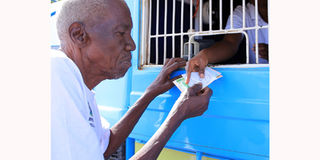Older persons right to join Parliament

Older persons rightfully felt aggrieved, neglected and left behind and have since the promulgation of the 1995 Constitution, been fighting for their right to take part in decision-making at all levels. PHOTO | FILE
I hold Ms Cissy N. Kagaba in high esteem and I have great admiration for her relentless anti-corruption crusade. However, her comment, "Constituencies for the elderly is corruption," (Daily Monitor, August 17), gives new meaning and dimension to the word corrupt as many know it. She joins a chorus of voices vexed by the representation of older persons in Parliament and using arguments that miss the point.
Government created Special Interest Groups (SIGs) and Article 32 of the Constitution provides that ‘The State shall take affirmative action in favour of marginilised groups on the basis of gender, age, disability or any other reason created by history, tradition or custom, for the purposes of redressing imbalances which exist against them.’
Chapter IV Article 21(1) of the Constitution provides under Equality and Freedom from Discrimination, that ‘All persons are equal before and under the law in all spheres of political, economic, social and cultural life and in every respect and shall enjoy equal protection of the law.’ From the foregoing, all SIGs should be treated equally.
However, the marginalisation, discrimination , and injustice against older persons were introduced by the same Constitution, which provides, under Chapter V on the Representation of the People, thus:
Article 78: Composition of Parliament. 78(1) Parliament shall consist of:
(a) Members directly elected to represent constituencies; (b) One woman representative for every district, (c) Such numbers of representatives of the Army, Youth, Workers, PWDs and other groups as Parliament may determine.
Older persons rightfully felt aggrieved, neglected and left behind and have since the promulgation of the 1995 Constitution, been fighting for their right to take part in decision-making at all levels, including in Parliament alongside the other SIGS. As a result of the protracted struggle, the following was achieved:
The Local Government Act was amended to allow for two people, a man and a woman, to represent older persons on local government councils.
The National Council for Older Persons was established in 2016 more than 20 years after the establishment, in 1993, of National Councils for Women and Youth and 10 years after that of PWDs in 2006.
Parliament passed the Bill creating five slots for MPs representing older persons. This did not require amending the Constitution contrary to what Ms Kagaba thinks.
Part V Section 8(3) of the Parliamentary Elections Act, 2005 stipulates that ‘in accordance with Article 78(2) of the Constitution, Parliament shall review the representation under Article 78(1), (b) and (c) of the Constitution and may by resolution, supported by not less than two thirds of all Members of Parliament, retain, increase or abolish any such representation”.
The argument often advanced is the number of 60+ year-olds in Parliament and, according to Ms Kagaba, in government, there is over representation of older persons. They represent other interests and older persons as SIG did not elect them.
Article V of the Protocol to the African Charter on Human and Peoples’ Rights on the Rights of Older Persons in Africa states, inter alia, that ‘Older Persons have the right to appoint a party of their choice to carry out their wishes and instructions.’
It is only fair that older persons join the other SIGs in Parliament or all the other SIGs get out of Parliament. The Equal Opportunities Commission Act vindicates position.




